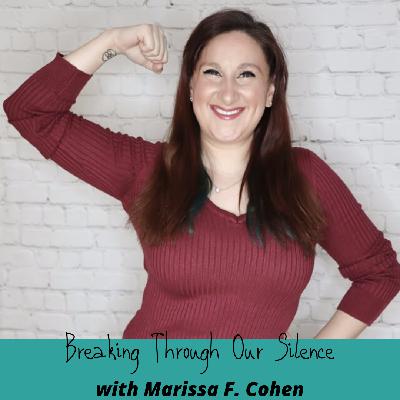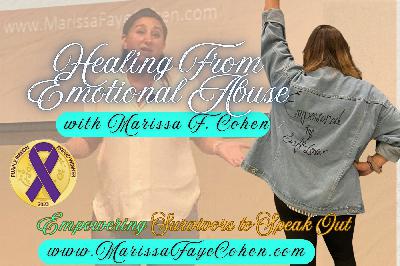Healing From Emotional Abuse: Movies About Narcissism : With Mike Sellari (Part 2)
Description
Can you heal from abuse? What do I do after leaving my narcissist? What does a healthy relationship look like? These concerns cross the minds of over 20 people every minute; over 28,800 people every day. And the sad fact is, we still don’t talk about it enough. Healing from Emotional Abuse isn’t a bandaid situation. But it doesn’t have to be a five year process either. Millions of other survivors around the worlds entire lives have been impacted by their narcissist. Yours doesn’t have to. To show you how to live a free, confident and peaceful life, your host and Founder of the Healing From Emotional Abuse Philosophy, Marissa F. Cohen.
Marissa:
Hey everyone! Welcome back to Healing From Emotional Abuse. This is part 2 of my conversation with Mike Sellari. Writer, director, producer and movie expert. With Mike’s insight, we were able to pick apart a bunch of movies with depicted sexual assault and discuss the necessity of those scenes, in relation to the themes of the films. If you haven’t heard part 1 yet, go check it out on Youtube, iHeart Radio, Spotify, Podbean, Stiticher, iTunes, basically any platform that hosts podcasts. In this episode of Healing Through Emotional Abuse, we dive a little deeper into the world of cinema. And just a heads up, some of these depictions of sexual assault may be graphic and potentially triggering. And there will definitely be movie spoilers.
Marissa:
I think that rape and sexual assault and domestic violence have been used as slapstick comedy for a really long time because it was not something that was really questioned. Every time somebody came forward about domestic violence through the late 90s, the police would show up, they would tell the narcissist or abuse to take a walk around the block, and they’d question the victim about what they did to piss off the abuser. That’s how it was handled. It wasn’t handled. That’s the problem.
Mike:
Yeah, and you see that. You see that in the first season of Veronica Mars, and it kind of carries on into the second season of Veronica Mars. It is about a rape, and she goes to the police to report it, and his response is, “You know, I think you should go see the Wizard, and ask him for some guts.” Or something like that. I don’t remember exactly what he tells her to ask for.
Marissa:
Because that still happens today, in real life. But also, I don’t know if you’ve seen the Netflix show, Unbelievable.
Mike:
Yeah, I love it.
Marissa:
Okay, Awesome! So, Unbelievable is based on true stories. It’s about several people who have been sexually assaulted or raped in various places around the country. And with the first case specifically, she goes to the police right away, she makes her report. They ask her the same question 55 times. And then they find one small detail that she mixed up, because it’s really easy for us to forget the exact order of things - who she called first was the thing she mixed up- and then they get her on that, convince her what happened didn’t happen, made her believe that the police were never going to help her. So she just admits defeat, says it was a lie, even though it wasn’t. And then she get ostracized for it.
That’s the kind of stuff I’m hoping becomes more common in film and tv - just like you were saying before. We have to see the uncomfortable stuff to really feel it and understand it, and take the severity of it to heart. If we don’t see it, if they were doing it off screen, or they do just soundbytes or it’s just a black screen or whatever, it takes the power and the discomfort away from us. And it makes it easy to excuse.
So even in the show 13 Reasons Why, which I know you’ve seen. When that show was released, the National Suicide Hotline said that their phone calls blew up 40x. So, 40x the normal number of calls were made to the hotline. Which is a phenomenal, but also awful, because you don’t know if those same people were already suicidal or if it was something they felt glorified suicide. The statistics were never conclusive. One thing I did really appreciate - I watched a little bit of the second season and it really felt like it was trying to bank too much on the #MeToo Movement, which pissed me off a lot - but I really appreciated the cinematography of the rape scene because it’s so, you just, it just. Oh god. The closeup of her face, and you just see her.. the life leave her eyes.
Mike:
Yeah
Marissa:
The humanity just falls out of her. And it lingers like 10 seconds too long. And they did that on purpose so that you could truly see the dehumanization of a person when they’re being raped.
Mike:
I’m going to move away from movies for just a second to mention a book that I just recently finished and I recommend to you and your listeners. It’s covering a lot of topics here. And what it’s called is Talking To Strangers. It’s a Malcom Gladwell book. The thesis of the book is that we as a society do not know how to talk to strangers. We do something called “defaulting to truth,” meaning that as soon as somebody says something to us, even if we haven’t met them before, our inclination is to believe that person. And the reason we do that is because if we don’t, society can’t function. That’s how society functions is because of default to truth. If everybody is super suspicious of every single person, we can’t trust anybody, society can’t function. The whole premise of the book is, we don’t know how to talk to each other. We don’t know how to make decisions regarding each other. We really don’t know how to read people. And because of that, problems arise. You can’t tell comfortability, or if you are, you’re not sure about it.
You look at people who have made these apologies and stuff like that in real life. And you can find the difference between the people we like and the people we don’t like. Dan Harmon comes to mind, where Megan Ganz accused him of sexual harassment. It’s what I mentioned before. He was always asking her out. He was her boss, she was afraid to do certain things. There was this sexual harassment thing, and she called him out on it and it became a whole situation. I highly recommend everyone to listen to his apology. It’s a masterclass of apologizing, how he did it on his podcast, talking about the situation. That’s why he’s still doing Rick and Morty and still able to do stuff. He has his show Harmontown.
Alright, we’re talking about abuse and all that stuff, we have to hit the main ones. There are two movies that we haven’t talked about that we’ve gotta talk about. First is, The Last Tango in Paris. Marlon Brando, there’s that infamous scene where he rapes her with butter. She talks about how that has affected her as a person and as an actress. Last Tango in Paris was a move, though, that was highly revered. People still talk about how much that movie has influenced them. Now, this girl was traumatized by this. She was 19 years old, they didn’t have it in the script. She showed up on the day, and they said, in this scene, he’s going to rape you and use butter as lubricant. It’s obviously not really happening but she was crying. The tears you see in the movie are her real tears. And Bertolucci and Brando defended themselves throughout the years, and it became contentious. I think that’s why the Last Tango in Paris doesn’t come up in the conversation of great cinema anymore, which is fine. There are movies that we revere at a time and then we can say, “We’re done with that.” And we can move on.
It can still exist and we can watch it for posterity. But we don’t always have to revere something because it was revered in the past. And I think we’re learning that more and more. And I think that’s something that, it took a while for people to treat women the right way, or at least closer to the right way. Movies we have to talk about. Last Tango in Paris, it’s a brutal thing, and we didn’t see it as brutal in the time.
On the flip side, there’s a movie that we do see as brutal and it was seen as brutal at the time. And that’s The Last House On The Left, and that’s Wes Craven’s first movie. I just watched it for the first time a couple months ago. I’d been putting it off for a while. I knew what it was about. They remade it recently, not as aggressive. And I mean, it’s a staple in horror cinema. When you watch it, you can see the moments of Wes Craven’s talent. I mean, you can see his talent in there.
The premise of the movie is, these two girls are going to a concert in the city. They meet this guy, he is like, “Hey, come hang out.” and stuff like that. Him and his family are actually escaped convicts. And they torture them, they keep them hostage. They rape one of the girls. It’s very brutal. And this one girl dies just walking into water, just defeated. It feels very much like an Ophelia moment, and she’s dead. And it’s just brutal watching it. And to a point, you can say i









